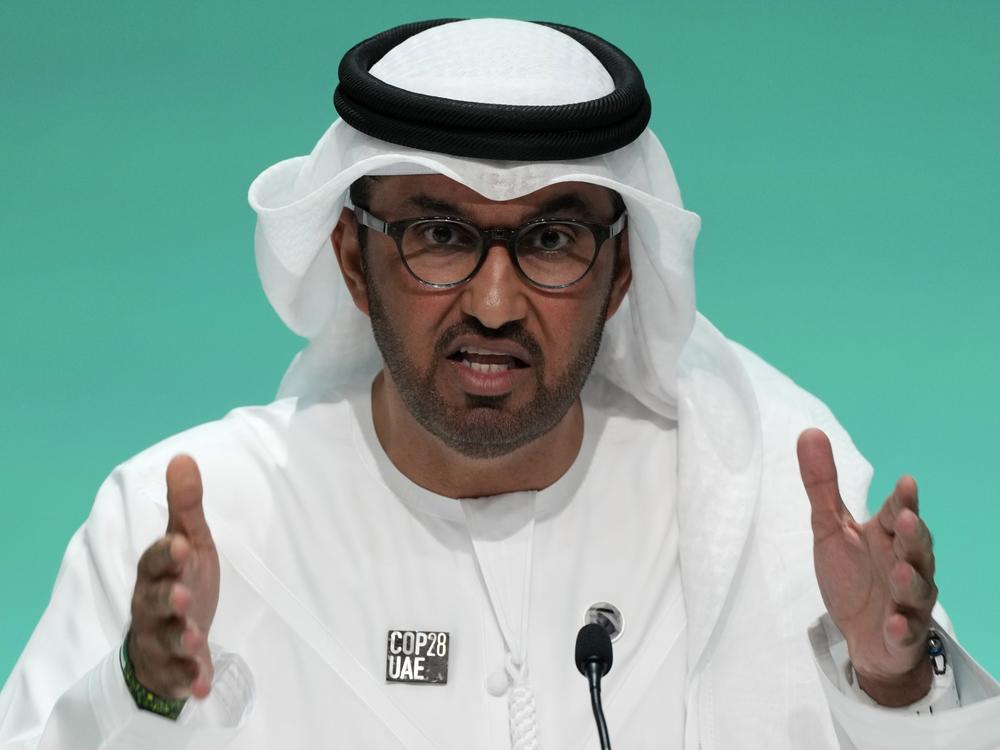Section Branding
Header Content
U.N. climate talks head says "no science" backs ending fossil fuels. That's incorrect
Primary Content
Updated December 4, 2023 at 9:17 AM ET
The head of United Nations climate talks underway in Dubai insisted incorrectly that there is no science to support phasing out fossil fuels to avoid catastrophic warming.
Sultan al-Jaber, who is also the chief executive of the United Arab Emirates' state-run oil company, made the comments in an online meeting on November 21. That was little over a week before he officially began to preside over annual U.N. climate negotiations, known as COP28, that are being held this year in the UAE. The comments were first reported by The Guardian, which also published a video of the meeting.
Al-Jaber sought to clarify those comments in a press conference on Monday from the climate summit he's presiding over. But his position as both chairman of a major Mideast renewables company and as CEO of Abu Dhabi's state-owned oil company has already drawn criticism and extra scrutiny of al-Jaber's role as this year's conference president, where he sets the tone and must unite countries around a common message and pledges.
In the video, Ireland's former president Mary Robinson asks al-Jaber to use his position to push for a global agreement to phase out fossil fuels. Such language was not included in the landmark 2015 Paris climate agreement, and has been repeatedly blocked by petroleum-dependent countries at subsequent negotiations.
That's despite unequivocal, and long-standing, scientific consensus that humanity must transition to renewable energy sources immediately in order to avoid catastrophic warming, including runaway sea level rise, mass extinction of plants and animals and countless lives lost to extreme weather.
In the video, however, al-Jaber responds to Robinson's suggestion with this incorrect statement: "I respect the science, and there is no science out there, or no scenario out there, that says that the phase-out of fossil fuel is what's going to achieve 1.5 [degrees Celsius]."
In reality, scientists warn that the only paths to limit global warming to 1.5 degrees Celsius require phasing out fossil fuels including oil, gas and coal. Under the Paris agreement, world leaders agreed to limit global warming to well-below 2 degrees of warming, and ideally no more than 1.5 degrees Celsius of warming, compared to temperatures in the late 1800s.
That's because, beyond 1.5 degrees Celsius of warming, numerous climate tipping points loom and millions of people are threatened by rising seas and extreme weather, scientists warn. The planet has already warmed about 1.1 degrees Celsius over the last 150 years, largely due to human activity.
The U.N.'s own scientific reports – which are supposed to guide global negotiations – repeatedly underscore the importance of phasing out fossil fuels. In order to limit global warming to 1.5 degrees Celsius, carbon dioxide emissions would need to decrease 80% by 2040 and 99% by 2050, compared to levels in 2019, according to the most comprehensive global scientific consensus report on climate change. That report was published earlier this year by more than 200 scientists from around the world working for the U.N.
And less than two weeks before this year's talks kicked off, the U.N. released an annual report that underscored the importance of reining in fossil fuel operations. It warned that, if humans extract and burn all the oil, gas and coal currently in development worldwide, countries would collectively emit more than three times the amount of carbon dioxide as is compatible with hitting the 1.5 degree Celsius temperature limit.
That means all new fossil development is incompatible with avoiding catastrophic warming, because, right now, there is not scalable technology that allows humans to burn fossil fuels without emitting enormous amounts of planet-warming gasses.
In remarks at the climate talks underway in Dubai on Monday, al-Jaber said that his comments in the video had been taken out of context, and insisted that he understands and supports climate science. "We're here because we very much believe and respect the science," he told reporters, explaining that global greenhouse gas emissions must be slashed this decade. "We need to make that happen to keep 1.5 within reach." He did not answer a question about exactly how quickly humans must stop relying on fossil fuels in order to achieve that goal.
Additional reporting was provided by Aya Batrawy in Dubai.
Copyright 2023 NPR. To see more, visit https://www.npr.org.

